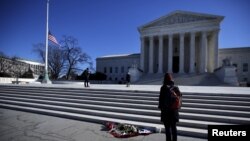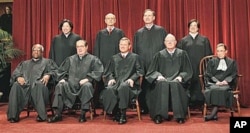In always politically combative Washington, the newest battle is over a name not yet known, whoever President Barack Obama nominates for the Supreme Court seat left vacant by the sudden death of Justice Antonin Scalia.
Obama, now in the last year of his presidency, says he will nominate a candidate for the lifetime position, and expects the Senate to give his choice a public hearing and to vote on it. But the unexpected high court vacancy, coming in the midst of the 2016 presidential campaign to pick his successor, leaves him with a variety of considerations in making the choice.
Chief among them is which possible nominee has a chance of winning a nomination fight in the U.S. Senate, where the majority Republicans are none-too-anxious to give the Democratic president the chance to clear what would be his third selection on the nine-member court.
Choice could tip balance
The nomination decision, depending on Obama's choice, is especially crucial because it could tip the ideological balance on the court from the current five to four conservative majority that included Scalia, to one favoring the court's four reliably liberal justices.
Numerous Republicans are vowing to block any Obama selection, with Democrats saying the court should not be left with a vacancy for a year or more until the next president takes office and names a Supreme Court candidate.
Already, Senate Republican leader Mitch McConnell said the country's next president, to be elected in November and taking office in January, ought to make the choice, to effectively give voters a say in the Supreme Court selection. Two Republican senators running for president, Ted Cruz of Texas and Florida's Marco Rubio, have vowed to fight against any Obama nominee, no matter who it is.
With such political opposition, Senate Republicans could effectively run out the clock on Obama's presidency, and his Supreme Court nominee. But Democrats supporting Obama already are accusing Republicans of being obstructionists in the fight over the nomination and that could eventually force McConnell to at least allow consideration of a nominee even if Republicans ultimately defeat the choice.
Possible names
Some legal analysts say Obama could nominate one of two judges who have in recent years already have won unanimous Senate approval for their current seats, Sri Srinivasan, who would become the Supreme Court's first Indian-American, and Jane Kelly, both of whom now are appellate court judges.
Several other names have been mentioned by legal experts as possibilities, including the country's current top law enforcement official, Attorney General Loretta Lynch, New Jersey Senator Cory Booker and several other appellate court judges.
Analysts say what is unknown is how Obama views the already contentious fight over his unnamed choice.
They are debating whether the president's main goal would be to win approval for the nominee, someone at least a few Republican lawmakers might vote for. Or perhaps, the analysts say, his choice might be to pick a nominee more attuned to his left-of-center political views, who likely would be defeated even as the loss might energize Democratic voters in the presidential election and Senate contests around the country in an effort to overturn Republican control of the legislative chamber and hand it to the Democrats.

